#fulgencio batista
Text
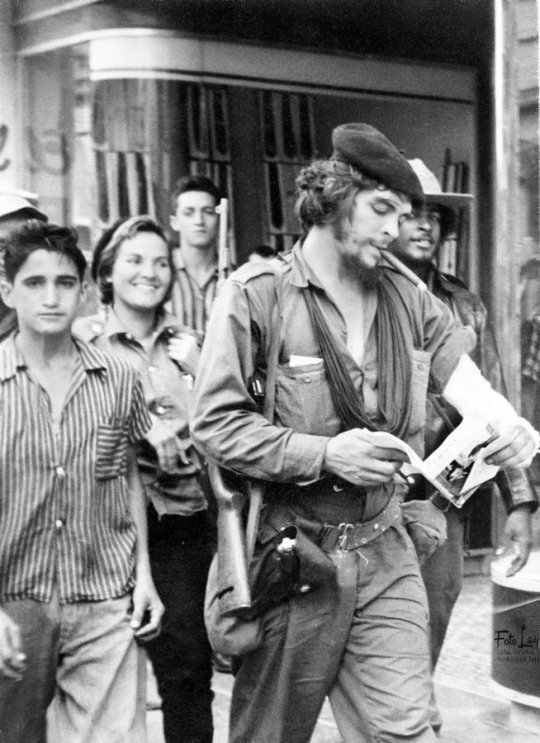
Este 30 de diciembre se cumplirá el 64 aniversario de la Batalla de Santa Clara, victoria decisiva liderada por el Che Guevara y el Movimiento 26 de Julio contra el dictador Fulgencio Batista. A las 12 horas de la captura de la ciudad, Batista huyó de la isla y triunfó la Revolución Cubana.
Source:Manolo De Los Santos @manolo_realengo
199 notes
·
View notes
Text

Cuban women, dressed in black, kneel on the sidewalk on Fifth Avenue across from St. Patrick's Cathedral, April 20, 1958. They earlier attended a mass at St. Patrick's to honor and pray for the memory of the victims massacred in Cuba under the Batista regime. Batista murdered 20,000 Cubans in seven years. The women said they were members of the Catholic Ladies of Cuba, a New York organization. Male supporters in the background hold U.S. and Cuban flags.
Photo: Associated Press via Univ. of Texas
#vintage New York#1950s#Fulgencio Batista#dictator#St. Patrick's Cathedral#prayer vigil#demonstration#April 20#20 April#Catholic Ladies of Cuba#Cuba
61 notes
·
View notes
Text
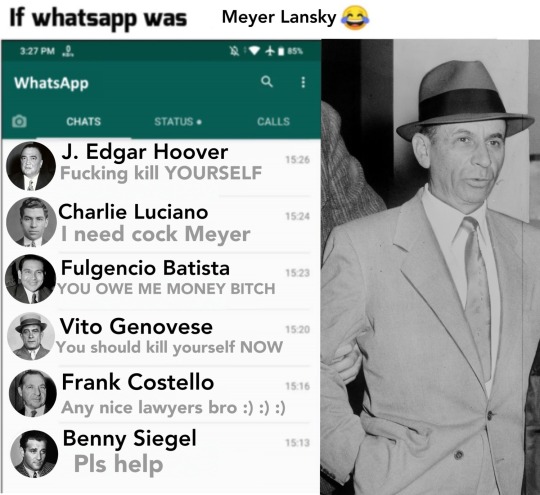
#meyer lansky#j edgar hoover#charlie luciano#fulgencio batista#vito genovese#frank costello#benny siegel#whatsapp meme
7 notes
·
View notes
Text
Fulgencio Batista is one example among many of people with mixed heritage who did not proclaim himself Black in any way, shape, form, or fashion:
Fulgencio Batista is an example of many things. Of the kind of leaders that the United States sponsored under the quasi-annexation the Platt and Teller Amendments secured. Of the kind of person who has mixed ancestry but did not consider himself Black (his ancestors were Black, Chinese, and Taino, as well as white, respectively). His regime was a brutal corrupt thing that had limited to no popular appeal, hence the ability of a relatively weak and puny movement led by Fidel Castro to depose it.
Batista also 'recruited' Haitian laborers in the sugar industry called Braceros who are in that nebulous 'not quite slavery' concept much like US sharecroppers in the Deep South who did live on cotton plantations and worked themselves to the bone in a region whose economy was very much reliant on their labor.
3 notes
·
View notes
Text
13 mars : les prémices de la révolution cubaine
Le régime cubain célèbre le 65e Anniversaire de l'attaque du palais présidentiel (Aniversario del ataque al palacio presidencial) en 1957. Une opération ratée qui a tourné au désastre. Le 13 mars 1957, des attaques simultanées ont été lancées contre le palais présidentiel (devenu aujourd’hui le musée de la révolution) et les locaux de Radio Reloj. L’objectif était d’assassiner le dictateur Fulgencio Batista et de lancer un appel au soulèvement populaire depuis la radio.
Cette opération a été menée par un groupe de jeunes révolutionnaires conduits par José Antonio Echeverría. Ils formaient un commando de 50 hommes armés qui a pris d’assaut le palais présidentiel tandis que José Antonio Echeverría investissait les locaux de la radio avec une quinzaine d’hommes. L’opération est un échec : Batista parvient à s’enfuir et la transmission radio est coupée en plein milieu du discours de José Antonio Echeverría sur Radio Reloj. Un grand nombre d’assaillants est tué pendant l’attaque.
Quant à José Antonio Echeverría, il trouve la mort dans un accrochage avec la police près de l’Université de La Havane après avoir quitté les locaux de Radio Reloj. La voiture dans laquelle il circulait a été interceptée par un véhicule de police à côté du campus universitaire et le chef étudiant est décédé mitraillé, il n’avait que 24 ans. Lui vivant, peut-être que Fidel Castro n’aurait eu qu’un rôle de second plan dans la suite de l’histoire.
Un article de l'Almanach international des éditions BiblioMonde
0 notes
Text
JUAN BOSCH HABLA DEL POETA NACIONAL PEDRO MIR
JUAN BOSCH HABLA DEL POETA NACIONAL PEDRO MIR
Pedro Mir, el poeta social esperado/Juan Bosch
Al enviarnos para su publicación estos hermosos versos, Juan Bosch nos dice del poeta: “Aquí está Pedro Mir. Empieza ahora, y ya se nota la métrica honda y atormentada en su verso. A mí, con toda sinceridad, me ha sorprendido. He pensado: ¿Será este muchacho el esperado poeta social dominicano?”.
De la…

View On WordPress
#Cuba#Dominican Republic#Fulgencio Batista#Juan Bosch#Listín Diario#Pedro Mir#República Dominicana#Spanish pronouns
0 notes
Text
“¡Señores, esto se acabó!”: la noche que Fulgencio Batista huyó de Cuba y le dejó el camino libre a Fidel Castro
Las horas finales del dictador cubano tuvieron ribetes insólitos. La fiesta que dio el 31 de diciembre por la noche y cómo dejó plantados a sus invitados para escapar. La situación económica de Cuba en el momento de la revolución. La carta del Che Guevara para romper con su primera esposa. El rol del embajador de los Estados Unidos. Y la extorsión del dictador dominicano Trujillo para dejar salir…
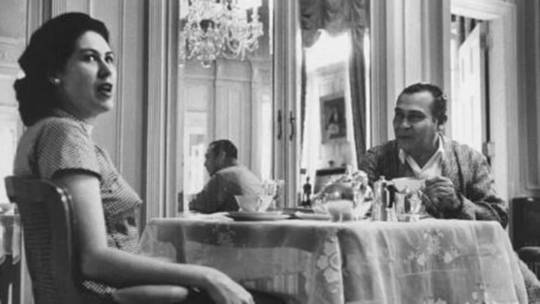
View On WordPress
0 notes
Text
De peperbus van nonkel Miele (60): 65 jaar Cubaanse revolutie
Maandag 1 januari 2024 vieren miljoenen Cubanen de 65e verjaardag van hun revolutie. Zoals gebruikelijk zal het nieuwe jaar 2024 en het revolutionair jubileum op oudejaarsavond worden begroet met 21 saluutschoten. Naast tal van activiteiten door het hele land, vindt er een centrale viering plaats in het Céspedes Park in de stad Santiago de Cuba. Daar kondigde de revolutionaire leider Fidel Castro…

View On WordPress
0 notes
Text
Fidel Castro: A Jornada de um Ícone da Revolução Cubana e seu Impacto Duradouro
Fidel Castro: A Jornada de um Ícone da Revolução Cubana e seu Impacto Duradouro
A história de Fidel Castro é uma saga que se inicia em origens modestas e culmina em uma liderança revolucionária marcante. Neste artigo, exploraremos a vida de Fidel Castro, desde sua infância até sua transformação em um líder icônico da Revolução Cubana, destacando seu impacto duradouro na história e sociedade…

View On WordPress
#Assalto ao Moncada#Ángel Castro#Cuba#Despertar Político#família de Fidel#Fidel Castro#Fulgencio Batista#IAs#Infância de Fidel Castro#Influência da mãe de Fidel#inteligências artificiais#irmãos de Fidel Castro#Laços Familiares na Revolução#mãe de Fidel Castro#Movimento 26 de Julho#Origens de Fidel Castro#Política#Raúl Castro#Revolução Cubana
0 notes
Text
Las Crónicas de Jendell (...): Blue por Fulgencio Batista - ZoePost
Las Crónicas de Jendell (…): Blue por Fulgencio Batista – ZoePost
Por Félix Antonio Rojas. En 1959 la República de Cuba era la economía número 29 del mundo, con uno de los PIB más altos de la región; gracias entre otras cosas a la visión europea de desarrollo, modernización, a la libertad economía y social impulsadas por ese Santo y hombre de paz, el austero, casi fraile franciscano General Fulgencio Batista… En la actualidad bajo la oscuridad del reinado del…
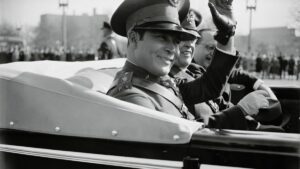
View On WordPress
0 notes
Text
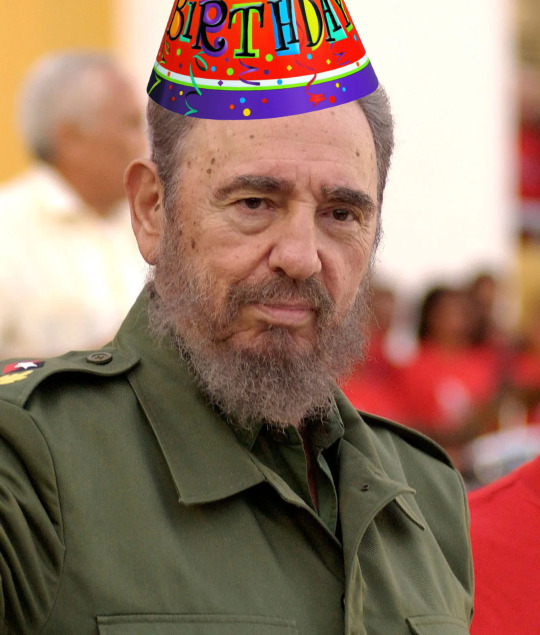
Happy birthday, Fidel Castro! (August 13, 1926)
The longtime leader of the revolution in Cuba, Fidel Alejandro Castro Ruz was born in Birán to a well-off family. Castro was radicalized during his legal studies at the University of Havana, coming to embrace anti-imperialism and opposition to US interference in the Caribbean and Latin America. Castro traveled abroad to participate in rebellions against right-wing governments in the Dominican Republic and Colombia, before returning to Cuba and setting his sights on freeing it from right-wing rule and US domination. After an initial abortive rebellion against Cuban dictator Fulgencio Batista failed, Castro spent several years in prison along with his comrades, who went on to form the nucleus of the 26th of July Movement. Released on amnesty, Castro went right back to revolutionary activity, spending time in exile. While away from Cuba, he met Che Guevara, who would go on to play a pivotal role in the revolution. On December 2, 1956, Castro landed with around 80 men on the Cuban shore, using a rickety and decrepit old yacht. The revolutionaries were ambushed by Batista's forces shortly thereafter, and their numbers slashed down to only around 20. From these 20 revolutionaries, Castro built up a revolutionary movement which swept Batista from power and liberated Cuba from imperialist control for the first time in history. Declaring himself a Marxist-Leninist, Castro went about radically transforming Cuba on a socialist model, instituting extensive land reform, a highly-effective literacy program, universal healthcare, and other such policies. He led Cuba through the heady early years of the revolution, in which the US constantly plotted to overthrow his government and assassinate him personally, through the Cuban Missile Crisis in which US bullishness came close to unleashing nuclear war, and through the end of the Cold War and the collapse of Cuba's ally the USSR. Castro instituted Cuba's celebrated policy of medical diplomacy, and in the Havana Declaration he expressed Cuba's intentions to support revolutionary movements abroad. Castro continued to lead Cuba until 2008, when he stepped down in favor of his brother Raul, and he died in 2016. Reviled in the United States and the imperial core, Castro remains a beloved and celebrated figure in the Global South, a symbol of anti-imperialism, resistance to US aggression, and hope for a better world.
"A revolution is not a trail of roses…. A revolution is a fight to the death between the future and the past."
448 notes
·
View notes
Text
""The Twilight Zone" is often lauded for its social commentary; it condemned things like racism and nationalism and beauty standards, even as the world around it failed to follow suit. It was a bold and innovative show, but it was also churning out up to 37 episodes a season, so a few clunkers were all but guaranteed. Such was the case with season 3's "The Mirror," an episode that is very much not ahead of its time. Instead, it's perfectly in line with mainstream political opinion in 1961, and it makes for a somewhat dull, grating viewing experience as a result.
The episode depicts this Castro-insert as a paranoid, sadistic and cartoonishly evil man. The previous leader he's overthrown, who in real life would be the brutal far-right dictator Fulgencio Batista, is portrayed in a comparatively sympathetic light.
The United States, which has a long history of interfering with Latin American governments, did indeed try to kill [Castro] on plenty of occasions. Yet "Mirror" depicts these assassination attempts as the feverish paranoid fantasies of Clemente; either that, or the direct results of an unhappy country being tortured by his tyrannical rule.
The other issue is that, as time goes on, it seems more and more like Castro was not quite the crazy evil dictator that American media presented him as. He still did plenty of terrible things worthy of condemnation, like his now-reversed criminalization of homosexuality in the '60s and his general inclination towards authoritarianism. On the other hand, he did raise the average quality of life in the country, initiated a successful literacy program, and implemented a healthcare system that's more efficient and humane than our own. Since Fidel took over, the country's infant mortality rate also fell from 37.3 to 4.3 per 1000 live births, lower than it is in America.
Considering Cuba accomplished all this while putting up with an economically suffocating 60+ year trade embargo from the United States, we're forced to admit that Fidel's revolution wasn't a total disaster. Despite the "Twilight Zone" episode's smug certainty that Fidel would crash and burn, his government has already outlived the majority of the episode's cast and crew."
60 notes
·
View notes
Photo
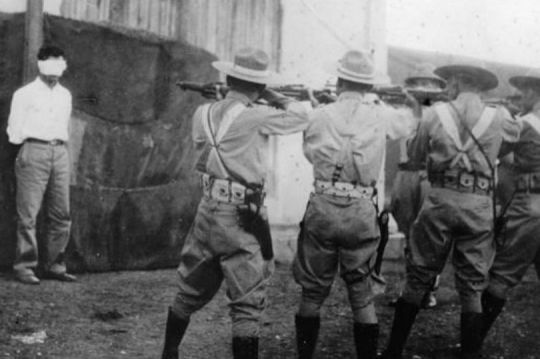
On this day, 10 March 1952, Fulgencio Batista led a coup in Cuba and appointed himself President. Backed by the US, business and the wealthy elite, his government killed thousands in anti-communist purges. Senator John F. Kennedy later described his rule: "Fulgencio Batista murdered 20,000 Cubans in 7 years — a greater proportion of the Cuban population than the proportion of Americans who died in both World Wars, and he turned democratic Cuba into a complete police state — destroying every individual liberty. Yet, our aid to his regime, and the ineptness of our policies, enabled Batista to invoke the name of the United States in support of his reign of terror. Administration spokesmen publicly praised Batista — hailed him as a stanch ally and a good friend — at a time when Batista was murdering thousands, destroying the last vestiges of freedom, and stealing hundreds of millions of dollars from the Cuban people, and we failed to press for free elections." Batista was eventually overthrown by the revolution in 1959. More information and sources: https://stories.workingclasshistory.com/article/8220/fulgencio-batista-coup Pictured: a Batista firing squad https://www.facebook.com/workingclasshistory/photos/a.296224173896073/2227374204114384/?type=3
325 notes
·
View notes
Text
Hot take (?) en el nombre humano de Cuba en Hetalia:
Una de las cosas que más me molestan de este fandom es lo poco que se molestan en estudiar historia de Cuba al elegir el nombre humano de Cuba.
Con respecto al nombre de pila, no tengo muchas quejas. Cualquier nombre dentro del espectro hispanohablante me parece perfecto. Solo no usen nombres inventados/de la generación "Y". Tengo trauma con esos nombres (mi mamá y mi tía son de la generación "Y").
Sin embargo, con respecto a la elección del apellido, tengo un par de cosas que decir. Agárrense a sus sillas y prepárense una meriendita. Esto se pondrá bueno.
El apellido que más he visto regado por el internet es "Machado". ¿Cuál es mi problema con este apellido? El siguiente:
No es un apellido común en Cuba.
Es el apellido de un maldito DICTADOR.
Les paso contexto para que entiendan mejor la situación.
En 1925, un tipo llamado Gerardo Machado asumió la silla presidencial. Al principio, era lo mismo que sus predecesores, todo un corrupto y un politiquero. Hasta que un grupo de jóvenes (me he dado cuenta que todas estas cosas las hace la gente joven) decidió pararle los pies porque el compañerito Machado estaba abusando de su puesto (nada fuera de lo común en todos los politicos de la pseudorrepública).
Entre esos jóvenes estaba Julio Antonio Mella, un líder estudiantil. ¿Adivinen qué hizo Machado con él? ¡Exacto, lo mandó a matar mientras estaba en México!
Y después dicen que Cuba antes de 1959 era un paraíso.
En fin, a Machado lo sacaron en 1933 . Justo antes que la Revolución del 30 fallara épicamente.
Otro apellido que no quiero ver ni de chiste (y que, por suerte, no he visto jamás y espero nunca ver) es Batista. ¿Por qué? Por las mismas razones que el anterior.
Y si creen que Machado era malo... Oh, cariño, no han visto nada aún. Fulgencio Batista era peor. Muchísimo peor.
Lo único bueno que hizo Batista fue dirigir al país durante la Segunda Guerra Mundial. Pero ni eso, porque el tipo estaba con Dios y con el Diablo (le vendía combustible a los Nazis (A. LOS. NAZIS) para sus submarinos, pero Cuba formaba parte del frente Aliado).
En 1952, el compañerito Batista protagonizó un GOLPE DE ESTADO. Sí, cómo escucharon. Un. Golpe. De. Estado. Y cualquiera que le llevara la contraria amanecía muerto en una esquina al día siguiente, ya fuera comunista o no.
Obviamente, nadie lo quería aquí (incluso los que no eran comunistas). Y mientras que Fidel Castro intentaba darle de baja desde la Sierra Maestra, la oposición de derecha intentaba sacarlo de la presidencia con elecciones y politiquería.
Conclusión, como a Batista nadie lo quería, excepto su amiguito Trujillo, huyó a Dominicana el 31 de diciembre de 1958. Por eso es que la Revolución Cubana triunfó el primero de enero de 1959.
Acá les dejo apellidos que deberíamos ver más seguido en el nombre humano de Cuba:
Céspedes (el que yo utilizo para mi OC).
Martí.
Maceo.
Agramonte.
Cualquiera que no sea Fernández (que ese ya lo tiene España)
Y eso es todo por hoy. Nos vemos luego. ¡Bai!
#hetalia#hetalia world stars#axis powers hetalia#hetalia axis powers#hws cuba#aph cuba#hetalia cuba#hot take#hetalia critical#en español porque suena más bonito#long post
42 notes
·
View notes
Text
And yes, Fulgencio Batista very much does count:
While he's mostly famous for losing to Fidel Castro these days, Batista was, ironically, a product of Black Cuban history where Fidel was very much lily-white Spanish. Fidel, in fact, was literally the son of a rich Spanish officer so far more Simon Bolivar than anything else. Batista, equally, was a much more opportunistic ruler than Castro was, having the main principle of swelling his own coffers and being utterly unscrupulous as to how he went about it. Which was why when he orchestrated the coup that took him to power and ended democracy in Cuba, such as it was, for the duration he spent that time as a beloved darling of the United States.
In reality it was PRECISELY for being such a beloved darling of the United States that Castro in turn would manage to overthrow him, and the longer-term effects of that are left for tomorrow with the main focus on Cold War Africa, not least because the USSR very happily treated Cubans as modern Russia does Chechens and Baikal Mongolians and sent them to die for it so no Russians died while they revenged themselves on Castro trying to start WWIII and throwing a temper tantrum when Moscow refused to set the world on fire for his sake.
There was also more than a bit of animosity from the lily-white Spaniard and the mixed-race Black general who embodied all the corrupt traditions of the old Cuba in Castro regime propaganda and beyond that there was at least some truth to it in reality. Like Idi Amin Batista is one of those cases where influential and good or benevolent are very far from synonymous.
#lightdancer comments on history#black history month#american history#cuban history#fulgencio batista
0 notes
Text

Fidel Castro gets a boisterous reception in New York, April 21, 1959, four months after he led a revolution that toppled the authoritarian government of Cuban President Fulgencio Batista.
Photo: John Duprey for the NY Daily News
108 notes
·
View notes